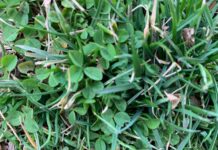Clover’s been here for years, but Miniclover® is getting a new look as an alternative to a traditional lawn.
The traditional lawn — neat, green, and free of weeds — has dominated American yards for decades. But a growing awareness of the environmental impacts of outdoor water consumption, herbicide and pesticide use, fertilizer runoff — plus the time and expense of lawn upkeep — have some homeowners seeking lawn alternatives.
For decades, clover has been relegated to weed status. But prior to that, clover was considered essential for lawns and was a standard component in lawn seed mixes. With the development of herbicides to rid lawns of broadleaf plants — which had no effect on grass but killed everything else, including clover — it was branded a weed.
Today, as interest grows in more natural, diverse, eco-friendly ground covers, clover is making a comeback.
Enter Miniclover® (Trifolium Repens), a green, fast-growing, and hardy ground cover that can help create a thick, lush lawn and requires less water, chemicals, and maintenance than turf grass.
Not be confused with invasive white Dutch clover, Miniclover® has smaller leaves, fewer flowers, and a lower growth habit, and can blend discretely with the appearance of an existing lawn.

A perennial, drought tolerant white clover, Miniclover® only grows to approximately 4 – 6 inches tall, making it an ideal lawn alternative, or to mix with lawn grass. With all the benefits of regular white clover just packed into smaller leaves, adding 2 – 5% of Miniclover® to a grass seed mixture will result in a much-improved lawn. Its ability to pull nitrogen from the air and fix or convert it to a usable form by the plants makes it a great companion for turf grass varieties, making them more drought tolerant. This quality benefits the turf grass plants, as well producing a healthy, dense, and naturally fertilized clover lawn that will require very little fertilizer maintenance.
12 Benefits Of Miniclover®
- Conserves water. Water once per week, after established.
- Nitrogen fixer. Takes nitrogen from the air and “fixes” it in the soil, eliminating need for nitrogen plant food.
- Never needs herbicides. Most herbicides kill clover.
- Drought tolerant. With long, deep roots, stays greener longer, is resistant to drought/tolerates wet conditions.
- Flowers once in summer. Blooms can be quickly eliminated with mowing.
- Erosion control. Dense, interconnected roots keep soil in place on slopes.
- Controls weeds. Growth habit via stolons, which grow horizontally along the ground, helps suppress weeds.
- Low to no maintenance. The more it’s cut, the smaller the leaf size. Without mowing, only grows 4-6 inches tall.
- Thrives in sun to partial shade.
- Stands up to foot traffic. Does well in compacted soil, fills in bare spots quickly.
- Unaffected by dog urine.
- Stays green longer than grass. Considered semi-evergreen or evergreen, can stay green year-round in areas where winters aren’t too cold.
According to Troy Hake, president and owner of seed source Outsidepride.com, people are noticing.
“I’ve been in business for 21 years — this year, Miniclover sales were up by 67% , a mind-blowing increase and indicator that consumers want to renovate their lawn and are taking quick, tangible action in accomplishing the task by renovating lawns using Miniclover,” comments Hake.











![[VIDEO] Dickies®: Discover Workwear That’s Anything But Uniform](https://turfmagazine.com/wp-content/uploads/2023/06/1647663814-4b1a2a7742790a9b1e97a3b963477850192e1d6a9dfba9b07214a77bae25d6e3-d-218x150.jpg)






























![[VIDEO] Dickies®: Discover Workwear That’s Anything But Uniform](https://turfmagazine.com/wp-content/uploads/2023/06/1647663814-4b1a2a7742790a9b1e97a3b963477850192e1d6a9dfba9b07214a77bae25d6e3-d-324x160.jpg)
The mini clover seed mix sounds like a good idea in theory when seeding a brand new lawn, but either in that use or used to overseed an existing lawn, what about the complete weed population in a given lawn.
You can’t have it both ways.
Until the general public is ready to accept a green lawn with weeds too, the mini clover idea is not acceptable in my view.
Even with a new lawn seeded with a mix including mini clover, what happens when the homeowner complains about the annual weeds in the summer, like spurge, oxalis and purslane?